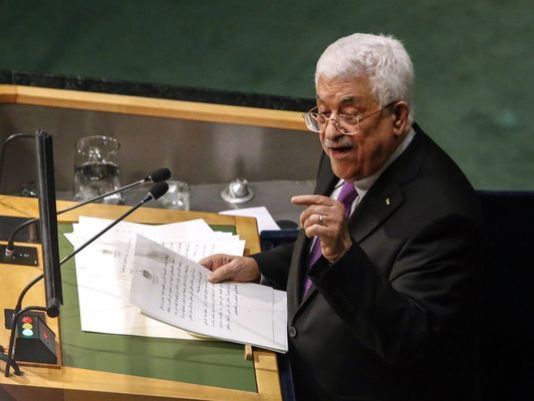Abbas abandons agreements with Israel

Frustrated with a failed peace process, Palestinian President Mahmoud Abbas told the United Nations on Wednesday that his government will abandon previous accords with Israel and said the Jewish state must now assume responsibilities in Palestinian territories as an occupying power.
“As long as Israel is not committed to its signed agreements, we for our part are not responsible for our agreements, and Israel must take full responsibility for its occupation,” Abbas said, speaking to the 70th U.N. General Assembly. “Israel must resume its role as an occupying power and bear responsibility for its conduct.”
The agreements he vowed to back away from include the 1995 Oslo Accords, which set up a process leading toward an independent Palestinian state.
Israeli Prime Minister Benjamin Netanyahu responded that Israel expects the Palestinian Authority to “act responsibly” and return to peace negotiations.
“We expect and call on the (Palestinian) Authority and its leader to act responsibly and accede to the proposal of the prime minister of Israel and enter into direct negotiations with Israel without preconditions,” the statement said. “The fact that he (Abbas) — time and again — has refused to do so is the best possible proof of the fact he does not intend to reach a peace agreement.”
Abbas enumerated a list of grievances against Israel, which he said has failed repeatedly to respect Palestinian rights, continues to expand settlements in the West Bank and East Jerusalem, and undermined the peace efforts of President Obama andSecretary of State John Kerry.
“All this has made the situation unsustainable,” Abbas said.
Abbas has made such statements in the past, and it is not clear how such a decision would work as a practical matter. The Palestinian Authority administers the West Bank and pays many salaries in the Gaza Strip, which is ruled by the militant Hamas group.
His speech came the same day that the Palestinian flag was raised at the U.N. headquarters for the first time as a non-member observer state — a move the General Assembly approved this month.
Aaron David Miller, a former Middle East peace negotiator and adviser to several U.S. presidents, said Abbas has threatened before to “return the keys” of the Palestinian territory to Israel, but doing so would create a mountain of practical difficulties for his own political standing, his Fatah party and the Palestinian people.
“If he’s prepared to suspend security cooperation with Israel, it’s not in his best interests,” Miller said.
It would mean no more paying of salaries for thousands of Palestinian government workers, including police, doctors and teachers. It would allow the rival Hamas party, the Palestinian branch of the Muslim Brotherhood, to gain influence in the West Bank, which is Fatah’s backyard. It would leave millions of dollars in donor aid with no one to spend it, Miller said.
“He’ll be accused of abandoning his people. It’s the nuclear option,” Miller said. “The question is: Is he serious.”
Palestinian analysts described Abbas’ announcement as an acknowledgement that the peace process has failed, and a threat that most said he is unlikely to carry out.
Diana Buttu, a former Abbas adviser based in the Palestinian capital Ramallah, said the Palestinian Authority “will not be dissolved anytime soon.”
“It is in the interests of both Israel and the international community for the PA to remain intact, and many Palestinians rely on it financially,” Buttu said.
The Palestinian Authority is a conduit for international funds for Palestinian organizations, it allows Israel to “subcontract enforcement of the occupation,” Buttu said.
The only realistic alternative for Palestinians is to seek to isolate Israel internationally through boycotts and other economic means, to seek justice for alleged Israeli violations of international law and Palestinian human rights, and through “unarmed resistance,” Buttu said.
Mouin Rabbani, senior fellow with the Institute for Palestine Studies, said Abbas’ speech is the result of “a failure of strategy, of vision, and represents the terminus of this form of politics.”
“The Palestinian people deserve better, and the challenge now is for them to create this better alternative,” Rabbani said.
USA Today